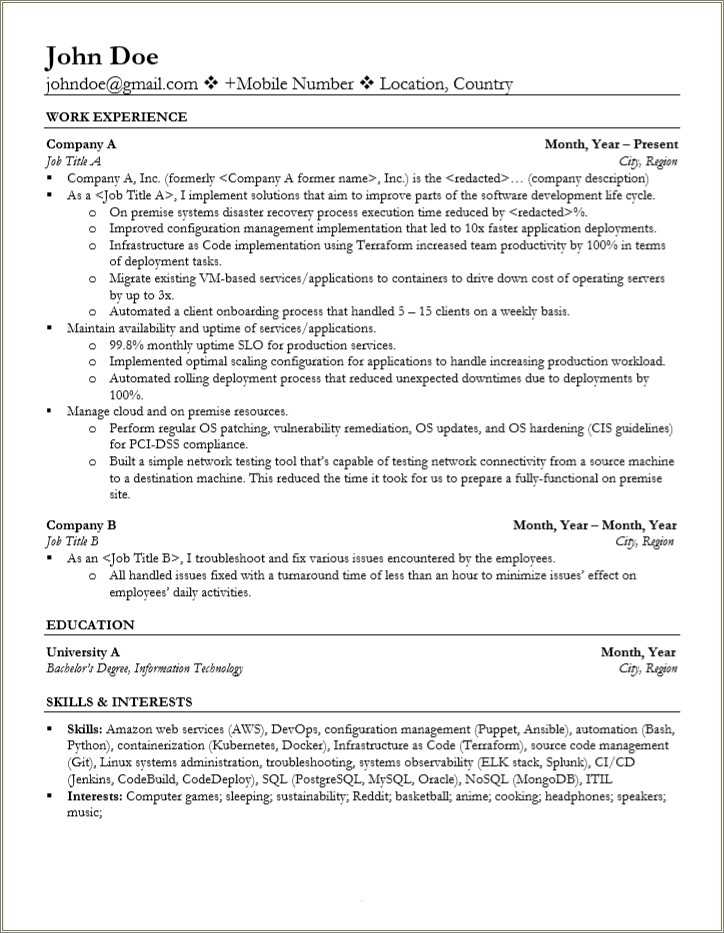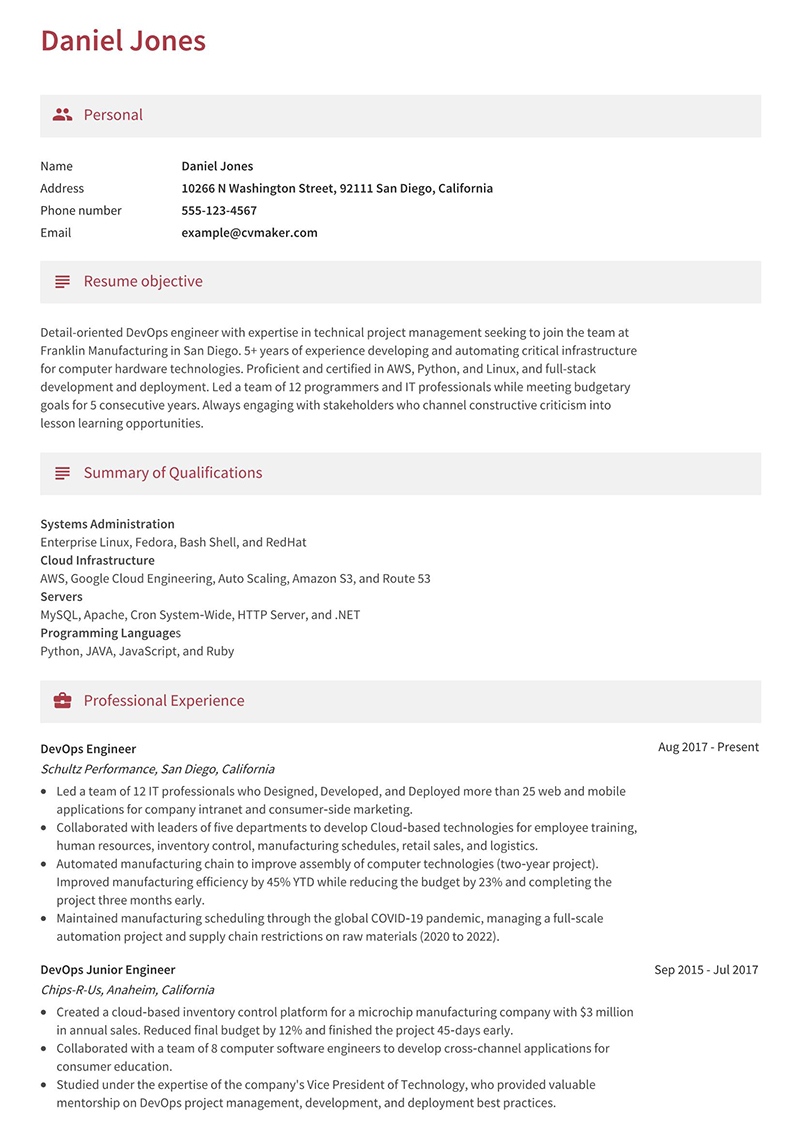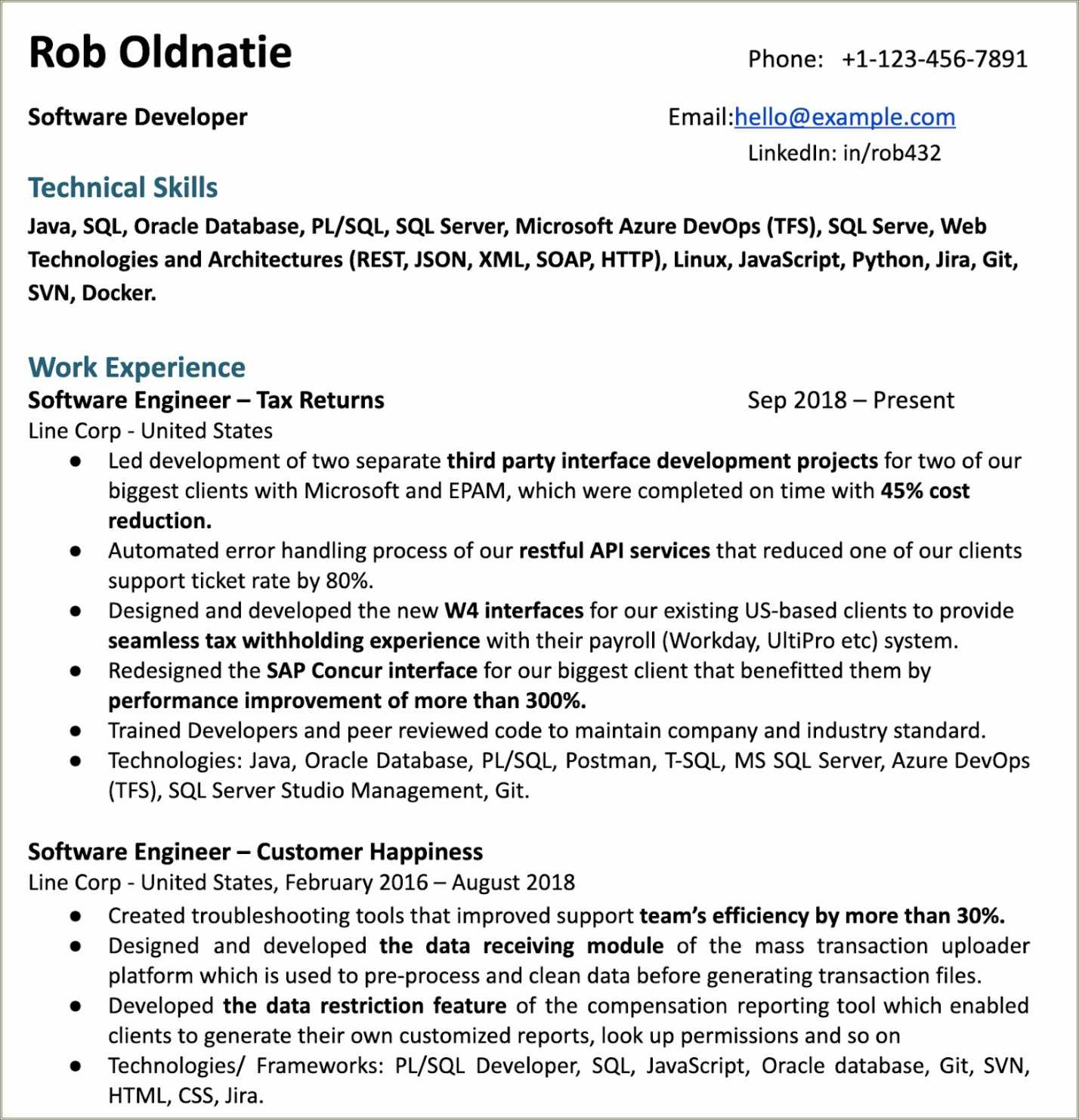The Significance of a Tailored Docker Resume
In today’s competitive tech industry, crafting a well-structured and targeted Docker resume is essential for job seekers. A tailored Docker resume allows potential employers to quickly identify your relevant skills, experiences, and certifications, making it more likely for your application to progress to the interview stage. By focusing on the specific needs of the job posting, you can demonstrate your understanding of the role and its requirements, setting yourself apart from other candidates.
Understanding Docker: A Brief Overview
Docker is an open-source platform that automates the deployment, scaling, and management of applications using containerization technology. Containers allow applications to run reliably across different computing environments, making Docker an essential tool for modern software development and operations. The growing demand for Docker professionals reflects the increasing adoption of containerization in the tech industry, as businesses seek to streamline their development processes and improve application portability.
With the rising importance of Docker in the tech landscape, having a strong Docker resume is crucial for job seekers looking to showcase their expertise and stand out in the job market. A well-crafted Docker resume can help potential employers quickly assess your skills and experience, increasing your chances of landing an interview and securing your dream job.
Essential Docker Skills for Your Resume
To create a robust Docker resume, it is essential to highlight your proficiency in various Docker skills. Here are some key Docker skills to include in your resume:
- Dockerfile creation: A Dockerfile is a text document that contains all the commands needed to build a Docker image. Demonstrate your ability to create efficient and secure Dockerfiles that follow best practices.
- Container orchestration: Container orchestration involves managing and scaling multiple containers across various hosts. Familiarize yourself with tools like Docker Swarm, Kubernetes, or Amazon ECS to effectively handle container orchestration tasks.
- Networking configurations: Showcase your understanding of Docker networking, including creating and managing custom networks, configuring network plugins, and implementing network policies.
- Volume management: Highlight your expertise in handling data persistence and sharing between containers using Docker volumes and bind mounts.
- Security: Emphasize your knowledge of Docker security features, such as user namespaces, capabilities, and security policies, to ensure the safe deployment and operation of Docker containers.
By incorporating these essential Docker skills into your resume, you can effectively demonstrate your expertise and increase your chances of landing a job in the competitive tech industry.
Showcasing Docker Projects and Achievements
Including Docker projects and accomplishments in your resume is a powerful way to demonstrate your expertise and practical experience with the technology. By showcasing your Docker projects, you provide potential employers with tangible evidence of your skills and capabilities, making your resume stand out in the job market.
When presenting Docker projects in your resume, consider the following best practices:
- Problem statement: Clearly outline the problem your Docker project aimed to solve. This will help potential employers understand the context and relevance of your project.
- Docker tools used: Specify the Docker tools and versions you used in your project, such as Docker Engine, Docker Compose, or Docker Swarm. This will give potential employers insight into your familiarity with various Docker tools.
- Real-world application: Explain how your Docker project relates to real-world scenarios or industry use cases. This will help potential employers see the value and applicability of your skills.
- Quantifiable results: Whenever possible, quantify the results and impact of your Docker project. For example, if your project improved application performance or reduced infrastructure costs, include these details in your resume. Quantifiable achievements help potential employers gauge the effectiveness and significance of your work.
By effectively presenting your Docker projects and accomplishments, you can create a compelling and differentiated resume that will capture the attention of potential employers in the tech industry.
Certifications to Boost Your Docker Resume
Obtaining Docker certifications can significantly enhance your credibility as a Docker professional and help you stand out in the job market. These certifications demonstrate your commitment to staying up-to-date with the latest Docker technologies and best practices, making you a more attractive candidate for potential employers.
Two popular Docker certifications include:
- Docker Certified Associate (DCA): The DCA certification is designed for candidates with a foundational understanding of Docker concepts and containerization principles. This certification covers topics such as Docker Swarm, Docker Compose, Docker Networking, and Docker Security. Earning the DCA certification can help you showcase your proficiency in Docker fundamentals and your ability to apply these skills in real-world scenarios.
- Docker Certified Professional (DCP): The DCP certification is an advanced-level certification for candidates with extensive experience in Docker and container orchestration. This certification covers topics such as Kubernetes, Docker EE, and Docker Swarm, as well as advanced networking and security concepts. Earning the DCP certification can help you demonstrate your expertise in complex Docker environments and your ability to lead Docker projects and teams.
By including Docker certifications in your resume, you can show potential employers that you have a verified and standardized level of Docker expertise, increasing your chances of landing a job in the tech industry.
Formatting Your Docker Resume for Readability
Formatting your Docker resume for readability is crucial for making a positive impression on potential employers. A well-formatted resume not only showcases your skills and experiences but also demonstrates your attention to detail and professionalism. Here are some best practices for formatting your Docker resume:
- Use bullet points: Bullet points help break up large blocks of text and make it easier for potential employers to scan your resume quickly. Use bullet points to list your skills, experiences, and accomplishments in a concise and easy-to-read format.
- Action verbs: Begin each bullet point with an action verb to clearly communicate your responsibilities and achievements. Action verbs such as “developed,” “implemented,” and “managed” help convey your initiative and impact in various roles.
- Clear section headings: Use clear and concise section headings to organize your resume and help potential employers navigate its content. Common section headings include “Skills,” “Experience,” “Education,” and “Certifications.”
- Customization: Customize your Docker resume for each job application by tailoring the content to the specific job requirements. This shows potential employers that you have taken the time to understand the role and how your skills and experiences align with their needs.
By following these formatting best practices, you can create a polished and professional Docker resume that is easy to read and highlights your relevant skills and experiences.
Incorporating Soft Skills into Your Docker Resume
While technical skills are crucial for Docker professionals, soft skills are equally important for success in the tech industry. Incorporating soft skills into your Docker resume can help demonstrate your ability to work effectively in a team, communicate complex concepts, and solve problems in a dynamic work environment. Here are some soft skills to consider including in your Docker resume:
- Communication: Effective communication is essential for collaborating with team members, presenting ideas to stakeholders, and documenting your work. Highlight your ability to communicate complex Docker concepts to non-technical team members and your experience in creating clear and concise documentation.
- Teamwork: Docker professionals often work in cross-functional teams, collaborating with developers, DevOps engineers, and system administrators. Emphasize your experience working in teams, your ability to contribute to group discussions, and your capacity to handle conflicts in a professional manner.
- Problem-solving: Docker projects often involve complex challenges and unexpected issues. Showcase your ability to analyze problems, develop creative solutions, and implement effective strategies for overcoming obstacles. Include examples of how you have applied your problem-solving skills to Docker projects and real-world scenarios.
By incorporating soft skills into your Docker resume, you can demonstrate your ability to work effectively in a dynamic and collaborative work environment, making you a more attractive candidate for potential employers.
Avoiding Common Docker Resume Mistakes
Creating a robust Docker resume requires careful attention to detail and a focus on best practices. Here are some common Docker resume mistakes to avoid and tips on how to create a polished, error-free resume:
- Using jargon: Avoid using excessive jargon or acronyms that may be unfamiliar to potential employers. Instead, use clear and concise language to describe your skills, experiences, and accomplishments.
- Failing to proofread: Thoroughly proofread your Docker resume to ensure it is free from spelling, grammar, and punctuation errors. Consider asking a friend or mentor to review your resume for a fresh perspective.
- Not providing enough context: When listing technical skills, ensure you provide enough context for potential employers to understand their significance. For example, instead of simply listing “Docker,” specify your proficiency in Dockerfile creation, container orchestration, or networking configurations.
- Ignoring resume length: While it’s important to showcase your skills and experiences, be mindful of your resume’s length. Aim for a concise and focused resume that highlights your most relevant and impressive achievements.
- Not tailoring your resume: Customize your Docker resume for each job application by tailoring the content to the specific job requirements. This shows potential employers that you have taken the time to understand the role and how your skills and experiences align with their needs.
By avoiding these common Docker resume mistakes, you can create a polished, error-free resume that effectively showcases your skills, experiences, and accomplishments to potential employers in the tech industry.







